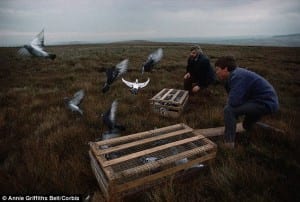 It may sound like something from a 1960s B-film, but a project in North Yorkshire that uses lasers to deter pigeons is proving remarkably successful.
It may sound like something from a 1960s B-film, but a project in North Yorkshire that uses lasers to deter pigeons is proving remarkably successful.
Gavin Milson, project technical assistant at Stockbridge Technology Centre, Cranfield University and high-tech GPS company Manterra reckon that using laser-based bird deterrents could be a cost-effective answer to dealing with the feathered fiends.
The equipment emits a strobing laser – akin to what you might find at a disco – which serves to scare off troublesome birds.
See also: Suffolk farmer battles pigeons with drones
In a Tru-Nject project – a high-tech study designed to investigate soil mapping and fertiliser application – had been set up to in late July this year, 165,000 pointed cabbage were transplanted at a North Yorkshire farm.
Normally the crop would be netted after transplanting, but the project team used a Dutch Agrilaser Autonomic laser, powered by a solar panel and deep-cycle gel battery.

Mr Milson is delighted with the outcome.
“This novel piece of technology appears to have effectively protected the cabbages.
“Its potential for bird control in field vegetables has generated significant interest and is threatening to emerge as a major, albeit unexpected, output from the project.
“Whilst light bird damage has been noted on selected plants in some isolated areas of the crop, complete loss of any individual plant to birds has not”
Gavin Milson, Stockbridge Technology Centre
“Whilst light bird damage has been noted on selected plants in some isolated areas of the crop, complete loss of any individual plant to birds has not.
“Indeed, the vast majority of plants have received no unwanted attention from pigeons at all.”
The Tru-Nject team are now discussing plans to fully test the system in an oilseed rape crop later this year, comparing laser-protected crops to unprotected control crops.
It is hoped that this will provide even stronger evidence that the Agrilaser can function as a stand-alone option to manage bird damage in field crops.
About Pigeon Patrol:
Pigeon Patrol Products & Services is the leading manufacturer and distributor of bird deterrent (control) products in Canada. Pigeon Patrol products have solved pest bird problems in industrial, commercial, and residential settings since 2000, by using safe and humane bird deterrents with only bird and animal friendly solutions. At Pigeon Patrol, we manufacture and offer a variety of bird deterrents, ranging from Ultra-flex Bird Spikes with UV protection, Bird Netting, 4-S Gel and the best Ultrasonic and audible sound devices on the market today.
Voted Best Canadian wholesaler for Bird Deterrent products four years in a row.
Contact Info: 1- 877– 4– NO-BIRD (www.pigeonpatrol.ca)

